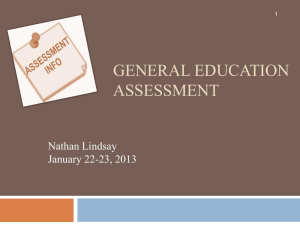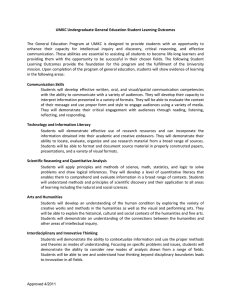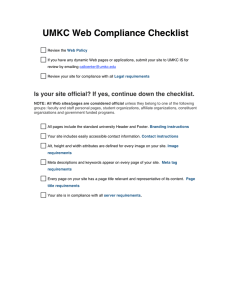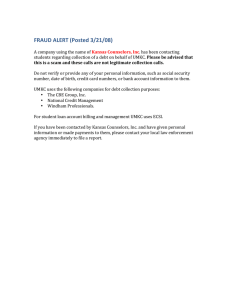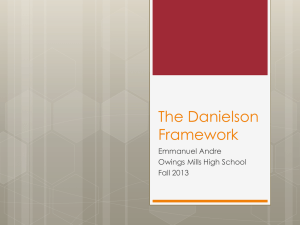UMKC General Education Core Assessment: 2013-14 Course Reports September 2015
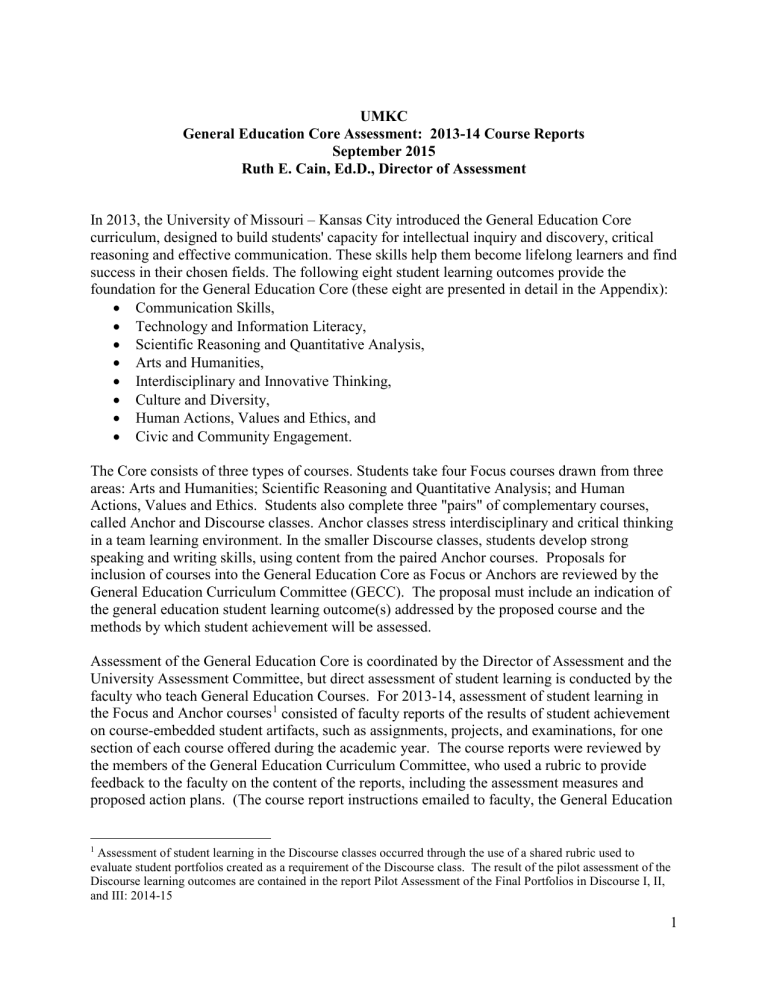
UMKC
General Education Core Assessment: 2013-14 Course Reports
September 2015
Ruth E. Cain, Ed.D., Director of Assessment
In 2013, the University of Missouri – Kansas City introduced the General Education Core curriculum, designed to build students' capacity for intellectual inquiry and discovery, critical reasoning and effective communication. These skills help them become lifelong learners and find success in their chosen fields. The following eight student learning outcomes provide the foundation for the General Education Core (these eight are presented in detail in the Appendix):
•
Communication Skills,
•
Technology and Information Literacy,
•
Scientific Reasoning and Quantitative Analysis,
•
Arts and Humanities,
•
Interdisciplinary and Innovative Thinking,
•
Culture and Diversity,
•
Human Actions, Values and Ethics, and
•
Civic and Community Engagement.
The Core consists of three types of courses. Students take four Focus courses drawn from three areas: Arts and Humanities; Scientific Reasoning and Quantitative Analysis; and Human
Actions, Values and Ethics. Students also complete three "pairs" of complementary courses, called Anchor and Discourse classes. Anchor classes stress interdisciplinary and critical thinking in a team learning environment. In the smaller Discourse classes, students develop strong speaking and writing skills, using content from the paired Anchor courses. Proposals for inclusion of courses into the General Education Core as Focus or Anchors are reviewed by the
General Education Curriculum Committee (GECC). The proposal must include an indication of the general education student learning outcome(s) addressed by the proposed course and the methods by which student achievement will be assessed.
Assessment of the General Education Core is coordinated by the Director of Assessment and the
University Assessment Committee, but direct assessment of student learning is conducted by the faculty who teach General Education Courses. For 2013-14, assessment of student learning in the Focus and Anchor courses
consisted of faculty reports of the results of student achievement
on course-embedded student artifacts, such as assignments, projects, and examinations, for one section of each course offered during the academic year. The course reports were reviewed by the members of the General Education Curriculum Committee, who used a rubric to provide feedback to the faculty on the content of the reports, including the assessment measures and proposed action plans. (The course report instructions emailed to faculty, the General Education
1 Assessment of student learning in the Discourse classes occurred through the use of a shared rubric used to evaluate student portfolios created as a requirement of the Discourse class. The result of the pilot assessment of the
Discourse learning outcomes are contained in the report Pilot Assessment of the Final Portfolios in Discourse I, II, and III: 2014-15
1
Course Assessment Report and the General Education Course Assessment Report Review rubric are located in the Appendix.)
This report presents an overview of the assessment methods and results from the 2013-14
General Education assessment cycle, including faculty determinations of whether 1) all outcomes were met, 2) none were met, or 3) some were met and some were not met. In addition, the report identifies the need to modify assessment of the General Education Core to facilitate collection of valid and reliable information concerning student achievement of the learning outcomes.
Data Collection
The original General Education Core assessment plan introduced in 2013 concurrent with the new program, stipulated the submission of an assessment report for one section of each Anchor and Focus course taught each academic year. Eighty-five Focus and Anchor courses were offered in 2013-14. Reports were received for 71 (84%) of the courses. Although only one report was required for each report, regardless of the number of sections offered during the academic year, two reports were received for two courses. Also, several reports, as noted below, did not include information concerning achievement of student learning outcomes. Therefore, 60 reports (71% of the course offered) are included in the following analysis, as detailed below.
Additionally, four of the eight General Education Core student learning outcomes (SLOs) are not included in this report. Only three reports were submitted for the Communication Skills outcome, which was not a sufficient number to include in the analysis. However, both the
Communication Skills and the Technology and Information Literacy outcomes are assessed by the rubrics used in the Discourse classes and reported in a separate document. The Civic and
Community Engagement outcomes was not assessed in 2013-14. This is the primary outcome for the Anchor III/Discourse III pair, which was not offered in the first year of the General
Education program, as students would not yet have had the opportunity to complete prerequisite course. There were no reports submitted for the Interdisciplinary and Innovative Thinking outcome, possibly because the GECC had not yet worked with faculty concerning the development of assignments to elicit the outcome and methods to assess student achievement.
The analysis, therefore, focuses on the following four General Education SLOs:
•
Scientific Reasoning and Quantitative Analysis: twenty-two reports submitted, of which four did not include results. Therefore, eighteen reports are included in the analysis;
•
Arts and Humanities: eighteen reports were submitted;
•
Culture and Diversity: six reports were submitted; and
•
Human Actions, Values and Ethics: twenty reports submitted, two without results.
Therefore, eighteen are included in the analysis below.
The Director of Assessment reviewed all reports submitted for the 2014-15 General Education
Anchor and Focus courses and aggregated and analyzed the data presented below.
Limitations
2
As detailed above, only four of the eight General Education Core learning outcomes are included in this report. Therefore, it is not a comprehensive assessment of the program. Further, although the report form indicated that summative grades should not be used to provide assessment results, a preponderance of the reports provided summative course grades or summative grades on assignments, exams, or other student artifacts, rather than providing results for specific student learning outcomes, as measured and reported by specific rubric criteria or exam questions. Additionally, not all reports provided clear links between the data reported and the
General Education outcomes identified in the course proposal and reports forms. For example, the report may have discussed the development of students’ writing abilities, but not their development of, say, the Culture and Diversity outcomes identified for the course. Additionally, some reports did not provide assessment data, but instead offered impressionistic appraisals concerning student achievement, on the order of “all students did well in the course.”
Given these limitations, although the results reported are, for the most part, highly positive, the aggregate results may not be considered valid, in that they are not directly linked to General
Education outcomes, or reliable indicators of the student achievement of the outcomes, due to reliance on summative grades or faculty impressions of student achievement without substantiating data. Nonetheless, a majority of the reports did provide reflections on ways in which the assessment process or aspects of the course could be improved to enhance student learning, which underscores the value faculty place on supporting student learning.
It should be noted that the members of the General Education Curriculum Committee, after their review of the 2013-14 course reports during Spring 2015, concluded that the initial assessment process did not provide information necessary to evaluate student achievement. The members are considering modifications to data collection methods to improve validity and reliability of the data. In addition to ensuring that meaningful data are collected, revisions to assessment methods could increase the efficiency of data collection. Suggestions concerning revising the General
Education program assessment process are contained in the Discussion section below.
Results
Of the 60 course reports reviewed, 44 (73%) indicated that students achieved the identified student learning outcomes; 10 (17%) reported mixed results, with some outcomes met and others not met; and 6 (10%) reported that the student learning outcomes were not met. Results for each of the four General Education Core outcomes for which reports were received indicated the following distributions among the findings:
• for Scientific Reasoning and Quantitative Analysis, of the 18 reports, 11 (61%) reported that the outcomes had been met; 4 (22%) reported mixed results; and 3 (17%) reported that none of the outcomes had been met;
• for Arts and Humanities, of the 18 reports received, 18 (100%) reported that the outcomes had been met;
• for Culture and Diversity, of the 6 reports received, 5 (83%) indicated that the outcomes had been met; and 1 (17%) reported mixed results; and
• for Human Actions, Values and Ethics, of the 18 reports received, 10 (56%) reported the outcomes had been met; 5 (28%) reported mixed results; and 3 (16%) reported the outcomes had not been met.
3
Further, of the 60 reports analyzed, 23 (38%) used summative course grades and 9 (15%) used summative grades on student artifacts, such as essays, projects, or exams. Ten (17%) of the reports provided no data, offering unsubstantiated statements concerning faculty perceptions of student achievement. However, 19 (32%) of the reports provided evidence concerning the achievement of specific student learning outcomes. The results of the analysis of the submitted reports are detailed in Table 1 below.
Table 1: General Education Anchor and Focus Course Assessment Reports – 2013-14
(N=60)
Met:
Summative course grade
Summative artifact grade
SLOs
No data (faculty statement)
Mixed:
Summative course grade
Summative artifact grade
SLOs
No data (faculty statement)
Not Met:
Summative course grade
Summative artifact grade
SLOs
No data (faculty statement)
Scientific
Reasoning and
Quantitative
Analysis
(N = 18)
11
8
1
2
4
3
1
Arts and
Humanities
(N = 18)
18
6
1
8
3
0
3
3
0
Culture and
Human
Actions,
Values and
Diversity
(N = 6)
Ethics
(N = 18)
5 10
4
3
1
1
3
3
1 5
1
2
2
1
0 3
1
2
Discussion and Moving Forward
Although 44 (73%) of the course reports indicated that the student learning outcomes had been met, 23 (52%) relied on summative grades and 9 (20%) provided no substantiating evidence.
Only 12 (27%) provided evidence of student achievement obtained through methods such as specific examination questions or rubric criteria that were directly linked to the identified student learning outcomes. The limitations of data collection and reporting methods make it difficult to draw conclusions concerning student achievement of the General Education Core student learning outcomes during the first year of the revised general education program.
After reviewing the 2013-14 course reports, the General Education Curriculum Committee
(GECC) recognized the need to revise assessment methods for the program. As one strategy to increase the efficiency of data collection and to provide time to for faculty to review results, plan course and program alterations to enhance student learning, and to assess the impact of the changes, three-year assessment plan was identified, as follows:
4
•
2015-16: Anchor I and Discourse I (Reasoning and Values) and Focus C (Human
Actions, Values and Ethics);
•
2016-17: Anchor II and Discourse II (Culture and Diversity) and Focus A (Arts and
Humanities); and
•
2017-18: Anchor III and Discourse III (Civic/Community Engagement) and Focus B
Scientific Reasoning and Quantitative Analysis).
Faculty teaching the Discourse I classes have developed and normed rubrics to evaluate students’ oral and written achievement and data will be collected using the shared rubrics in all sections of
Discourse I in 2015-16. These rubrics include criteria that evaluate student achievement of the
Communication Skills and the Technology and Information Literacy Outcomes. The Director of
Assessment will aggregate, analyze, and report the results of the Discourse I assessment.
In view of the limited usefulness of the data collected in 2013-14 through the General Education
Course Assessment Reports, and based on the feedback from faculty in the assessment reports and through other means of communication, the GECC and Assessment office are engaged in discussions concerning ways to increase the validity and reliability of the assessment findings.
There are a number of ways in which assessment of the General Education Core could be approached. For example, one method would be to develop a shared rubric and create a review panel for each of the six outcomes not assessed in the Discourse classes: Scientific Reasoning and Quantitative Analysis, Arts and Humanities, Interdisciplinary and Innovative Thinking,
Culture and Diversity, Human Actions, Values and Ethics, and Civic and Community
Engagement.
Specifically, the GECC would work with faculty to develop and norm rubrics for the outcomes.
Faculty teaching an Anchor or Focus course that includes the General Education outcomes to be assessed during a specified cycle would participate in assessment during that academic year.
Representative samples of student artifacts submitted for assignments designed to elicit the identified general education SLO would be provided to the GECC. Members of the GECC and additional faculty would serve on external review panels to evaluate the student artifacts using the shared rubric. Each faculty member would receive aggregate results for all artifacts submitted for the specified outcome, as well as results for his or her specific course(s). After reviewing the results, faculty would submit to the GECC a brief response to a series of prompts, such as:
1.
What do the results indicate about student achievement of the learning outcome?
2.
What alterations would you like to make to your course to improve student achievement of the general education or course-specific student learning outcomes (e.g., assignment redesign, developing alternative assessment methods, or increasing student engagement with the material)?
3.
What supports are needed to improve student learning of the general education outcomes?
Use of shared rubrics will provide means to assess achievement of the specific General
Education Core learning outcomes across courses and disciplines, providing evidence of those outcomes on which students are performing at expected levels and those for which achievement targets have not been met. The use of external review panels would also alleviate the criticism
5
from faculty that the assessment process is too labor intensive for faculty engaged in teaching the
Focus and Anchor courses. The assessment information and the suggestions provided by faculty would be used by the GECC and the FaCET to create professional development opportunities to enhance student achievement of the identified outcomes. Additionally, a cyclical approach to assessing the outcomes will provide necessary time between data collection to identify areas of needed improvement, develop and implement strategies to improve student learning, and assess the impact of those improvements, as well as potentially relieve faculty of the burden of collecting data for all Anchor and Focus courses each year.
It should be noted that a substantial majority of the 2013-14 course reports did include action plans to enhance student learning. Planned improvements mentioned include:
• introducing strategies to improve students writing and critical thinking abilities, such as workshopping, increasing feedback, and spending additional class time on research methods and writing;
• revising syllabi, course rubrics, and assignments to better communicate the intended student learning outcomes;
• developing additional course components to enhance student understanding of the course material and improve student engagement in the course; and
• revising or developing new measures to assess student achievement of the student learning outcomes.
These and other action plans demonstrate the priorities faculty place on supporting student learning. Improved data collection in future assessment cycles will help to provide specific areas for programmatic and course alterations to enhance student learning.
6
Appendix
7
General Education Core 2013 Student Learning Outcomes
•
Communication Skills o Students will develop effective written, oral and visual/spatial communication competencies and the ability to communicate with a variety of audiences. They will develop their capacity to interpret information presented in a variety of formats. They will be able to evaluate the context of their messages and use proper form and style to engage audiences using a variety of media. They will demonstrate their critical engagement with audiences through reading, listening, reflecting and responding.
•
Technology and Information Literacy o Students will demonstrate effective use of research resources and incorporate the information obtained into their academic and creative endeavors. They will demonstrate their ability to locate, evaluate, organize and use research material from a broad range of sources. Students will be able to format and document source material in properly constructed papers, presentations and visual formats.
•
Scientific Reasoning and Quantitative Analysis o Students will apply principles and methods of science, math, statistics and logic to solve problems and draw logical inferences. They will develop a level of quantitative literacy that enables them to comprehend and evaluate information in a broad range of contexts. Students will understand methods and principles of scientific discovery and their application to all areas of learning, including the natural and social sciences.
•
Arts and Humanities o Students will develop an understanding of the human condition by exploring the variety of creative works and methods in the humanities, as well as the visual and performing arts. They will be able to explain the historical, cultural and social context of the humanities and fine arts. Students will demonstrate an understanding of the connections between the humanities and other areas of intellectual inquiry.
•
Interdisciplinary and Innovative Thinking o Students will demonstrate the ability to contextualize information and use the proper methods and theories as modes of understanding. Focusing on specific problems and issues, students will demonstrate the ability to consider new modes of analysis drawn from a range of fields. Students will be able to see and understand how thinking beyond disciplinary boundaries leads to innovation in all fields.
•
Culture and Diversity o Students will draw on a variety of disciplines to develop an understanding of the complexities of human cultures, past and present, and come to an informed sense of self and others. Students will demonstrate an awareness of a global culture that may include economic, environmental, political and social issues facing all cultures. They will develop an understanding of the factors defining cultural identities.
8
•
Human Actions, Values and Ethics o Students will analyze, interpret and/or reconstruct human events, experiences, actions and interactions. Students will understand principles of value and civic duty in a wide range of settings and will demonstrate an understanding of personal values and the values of others. Students will be able to identify ethical problems using their understanding of ethical theory and moral reasoning.
•
Civic and Community Engagement o Students will be able to identify the problems, challenges and opportunities of an urban university. Students will also understand their relationship to both a local and global community and the social, political and cultural issues therein. They will develop an appreciation for the meaning and global impact of urbanization.
They will have an understanding of the U.S. and Missouri Constitutions and their impact on issues facing these various communities. They will engage with the
UMKC community of learners.
9
Sample General Education Course Assessment Instructions Sent to Faculty
From: UMKC-Assessment
Sent: Thursday, January 22, 2015 1:22 PM
To: UMKC-Assessment
Cc: Watson, Amy R.; Pemberton, Cynthia; Glesner-Fines, Barbara; Stroud, Daniel I. (UMKC-
Student); Cain, Ruth E.; Wyckoff, Gerald; Plamann, Lynda S.
Subject: Reminder: Year 2 General Education Course Assessment Reports from Fall 2014
Anchor and Focus Courses Due by February 1, 2015
Importance: High
Dear Instructors of Fall 2014 Anchor and Focus Courses,
Last semester the UMKC Assessment Office contacted all Fall 2014 Anchor and Focus course instructors to share resources to complete the annual General Education Course Assessment
Report. If you are receiving this email, it means that an Assessment Report for the Gen Ed course(s) in Fall 2014 for which you were listed as Instructor has not yet been received. I am resending the attached Gen Ed Course Assessment Report Template for your convenience, and I have also included two well-written sample reports from Beth Miller Vonnahme from Political
Science (Gen Ed Outcome “Human Actions, Values, and Ethics”) and from Eric Hall and Bill
Kalahurka from Mathematics & Statistics (Gen Ed Outcome “Scientific Reasoning and
Quantitative Analysis”).
Each Gen Ed Anchor I, II, and III and Focus A, B, and C course must be assessed at least once a year.
If the same course taught in Fall 2014 will be offered again in Spring or Summer
2015, only one Gen Ed Assessment Report for the course is needed each year . Similarly, if multiple instructors taught the same course, or if the course offering is cross-listed with other courses, only one course report is required for the course for 2014-15. These short, 2-3 page reports for each course offered in Fall 2014, Spring or Summer 2015 will be reviewed by the
General Education Curriculum Committee (GECC) and feedback will be sent to the instructors.
If you are completing an Anchor or Focus course assessment report from Fall 2014, please email your 2-3 page report by February 1, 2015 to: umkcassessment@umkc.edu
As the
Instructor or as the Coordinator of the course, you will report your Gen Ed findings and action plans. These should focus on the Gen Ed learning outcome(s) addressed by the course. For the findings, we encourage you to be detailed , using specific numbers or percentages when possible. Do not use course grades or overall scores on a test or essay. The most useful data indicates where students’ performance was stronger and where it was weaker. Feel free to attach charts and tables if desired. For the action plans, you might highlight how the course could be improved, and what changes in the course content or pedagogy you plan to make, based upon on the findings.
Barbara Glesner-Fines, our FaCET Faculty Mentor for Assessment, is available to offer assistance with completing the course assessment report: GLESNERB@umkc.edu
, and the
Assessment Office also can provide support. The original course proposal documentation included the learning outcomes, measurements, and achievement targets for Gen Ed courses, and
10
this information can be copied from the proposals .
If you do not have access to the original course proposal, please email the Assessment Office and we will provide this information.
Email: umkcassessment@umkc.edu
The General Education Curriculum Committee (GECC) will review course assessment reports and provide feedback to instructors on an annual basis related to Gen Ed Learning Outcomes.
Then, the following will occur:
- Based on the individual course reports, summary reports for each of the 8 General Education
Learning Outcomes will be written by two-person GECC faculty teams. These short reports will synthesize the overall findings and trends for each Gen Ed outcome.
- The University Assessment Committee will review the GECC reports, and 8 finalized reports will be uploaded in WEAVE each year.
- The GECC and Assessment Office will provide feedback to individual course instructors, giving recommendations on how to improve the assessment process for the coming semester or year. The feedback from 2013-14 course reports will be shared early in the Spring 2015 semester.
The GECC has approved this process, and this approach to General Education assessment and reporting helps the process to be faculty- driven and incorporates the benefits of peer feedback. Gen Ed Course Assessment Reports from Spring or Summer 2015 will be due by
October 1, 2015.
If you have any questions or need assistance prior to February 1, please contact me
( friendji@umkc.edu
), Lynda Plamann ( PlamannL@umkc.edu
) or Gerald Wyckoff
( wyckoffg@umkc.edu
). After February 1, we welcome our new UMKC Director of
Assessment, Dr. Ruth Cain , who will be available to meet with faculty and departments to support this process ( cainre@umkc.edu
).
Thank you for your support of excellence through assessment of our General Education learning outcomes!
Jennifer
Jennifer Friend, Ph.D.
Assistant Dean of the School of Graduate Studies
Interim Director for Assessment
Associate Professor of Educational Leadership, Policy & Foundations
300F Administrative Center | 5115 Oak Street | Kansas City, Missouri 64110-2499
Phone: 816-235-1196 | Fax 816-235-1310
11
General Education Course Assessment Report
Course Title:
Course Number:
Year/Semester course was originally approved as a GenEd course:
Assessment data reported below were collected in:
___ FALL ___ SPRING ___ SUMMER
Instructor(s):
1. Which of the eight General Education learning outcomes does this course address, as specified in the original course proposal documentation? (see http://www.umkc.edu/provost/academic-assessment/general-education.asp
)
2. What was the course-specific learning outcome (or outcomes) that measured the General
Education learning outcome?
3. How was the learning outcome assessed? (i.e., describe the measurement(s) used, such as a rubric or specific test questions that directly measure the General Education outcome. These measurement instruments can be attached.)
4. What was the achievement target, as specified in the original course proposal documentation? (i.e., the desirable level of performance for your students, and what percentage of students did you expect to achieve this?)
5. What were the results/findings, and what is your interpretation/analysis of the data?
(Please be detailed, using specific numbers/percentages when possible. Do NOT use course grades or overall scores on a test/essay. The most useful data indicates where students’ performance was stronger and where it was weaker.)
6. What are your action plans? (i.e., how could the course be improved, and what changes in the course content or pedagogy do you plan to make, based upon on the findings?)
Name of Person(s) Submitting the Report: __________________________________(Print)
____________________________(Signature)
Department:
Telephone Office Number:
Email Address:
___________________ _________________
___________________ _________________
___________________ _________________
12
General Education Course Assessment Report Review
Assessment Cycle:
2013-2014
Course Number(s) and
Course Name
Academic Unit: Department/Division:
Unit Dean: Email:
Department Chairperson:
Instructor(s):
General Education
Outcome(s):
Coursespecific
Student
Learning
Outcomes
(SLOs) Linked to Gen Ed
Learning
Outcome(s)
Comments
Measures
(How the SLOs were assessed) &
Achievement
Target
Initial
Course SLOs are vague and are not linked to the
Gen Ed Learning
Outcome(s) associated with this course.
Measures listed, vague & not linked to Gen Ed
Learning Outcomes
Emerging
Course SLOs are somewhat aligned with the Gen Ed
Learning Outcome(s) associated with this course;
Course SLOs need to be specifically linked to the Gen Ed
Learning Outcome(s).
Email:
Email:
Developed
Course SLOs are specifically mapped to the Gen Ed Learning
Outcome(s) associated with this course.
Measures listed are linked to
Gen Ed Learning Outcomes; only indirect measures used - primarily surveys, grades & self-reports; Criteria for student success are not identified & are not associated with each measure
Multiple measures used & linked to specific Gen Ed
Learning Outcomes;
Indirect/Direct methods used;
Criteria for student success identified & associated with each measure
Comments
Results &
Interpretation
Results vague & nonspecific
Results are summarized but not linked to student outcomes
Comments
Action Plan
Part 1: Course
Improvement
Adjustments to course based on student learning outcome data discussed among faculty
Findings discussed; Improvement strategies identified
Results are explained, collected according to course assessment plan; Linked to SLOs
Findings discussed and improvement strategies are identified; Recommendations made for course improvement
Completed assessment cycle/highly developed
Course SLOs are strongly tied to the Gen Ed Learning
Outcome(s) associated with this course. SLOs are specific and measurable, and are appropriate for the level of course.
Measures explained & linked to specific Gen Ed Learning
Outcomes; Authentic performance-based direct & indirect methods used; Criteria for student success identified & associated with each measure
Results are clearly explained, linked to SLOs, and patterns & trends identified
Findings discussed and improvement strategies are identified; Recommendations made for course improvement;
Evidence of change implementation & course improvement based on report information
13
Initial Emerging Developed
Completed assessment cycle/highly developed
Comments
Part 2:
Assessment
Plan
Comments
Adjustments to assessment plan based on student learning outcome data discussed among faculty
Findings discussed;
Improvement strategies identified
Findings discussed and improvement strategies are identified; Recommendations made for assessment plan improvement
Findings discussed and improvement strategies are identified; Recommendations made for assessment plan improvement; Evidence of change implementation & assessment plan improvement based on additional assessment cycle data
Overall Comments
[insert comments here]
For additional assistance on improving your assessment plan, we would encourage you to meet with Barb Glesner-Fines, FaCET’s Assessment Mentor. You can schedule a meeting by contacting her at extension 2380 or at glesnerb@umkc.edu
. You can also meet with Ruth Cain, UMKC Director of Assessment, by contacting 235-6084 or cainre@umkc.edu
.
Reviewed by: General Education Curriculum Committee Review Date: Spring 2015
Glossary of Terms
Achievement Target/Successful Achievement Criteria: overall level for satisfactory performance on a student learning outcome
Action Plan: activity sequence designed to help accomplish intended outcomes/student learning outcomes and/or improvement of academic assessment plan
Findings: assessment results for comparison of actual vs. expected achievement level
Measure: method to gauge achievement of expected results
Outcome/Student Learning Outcome: measurable statement that describes the knowledge, skill or attitude/disposition students will possess upon achievement of that outcome as it relates to the course
14
